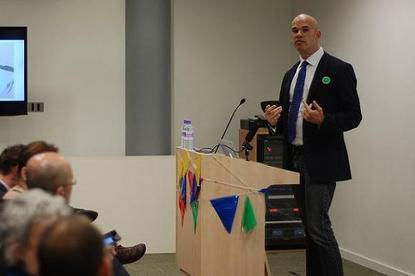Former govt digital chief takes aim at public sector IT buying habits
- 05 December, 2016 14:10

Former Digital Transformation Office CEO, Paul Shetler (Image originally featured on cio.co.uk)
The former chief executive officer of the government’s Digital Transformation Office (DTO), Paul Shetler, has taken aim at inefficiencies in the public sector’s IT buying habits, as he steps away from his short-lived role as the country’s digital chief.
Shetler revealed on 30 November that he would step down from his role as the Federal Government’s new Digital Transformation Agency's chief digital officer, just weeks after taking on the job.
In a blog post marking his departure, Shetler suggested that the public sector remains somewhat mired in IT procurement and project inefficiencies, despite the steps the government has taken to improve its processes.
“When it comes to service delivery, the transaction volumes of government services are small compared to the wider world,” Shetler said in the post, published on 3 December.
“And still, government spends more than $16 billion a year on IT. Our procurement and funding processes encourage big IT programmes, with bigger contracts. They drive a culture of blame aversion which creates the perverse outcomes and actually increases risk.
“The history of the past several years of government IT failure is testimony to that," he said.
"This is further complicated and exacerbated by the lack of technical and contract management expertise in government. (Too frequently, we actually ask vendors to tell us what they think we should buy)."
Shetler’s comments are particularly poignant, coming in the wake of the Australian Bureau of Statistics’ (ABS) Census 2016 portal outage in August.
The event, which saw the online portal taken offline for several hours following a series of distributed denial of service (DDoS) attacks, has seen both the project’s contracted IT lead, IBM, and the government agency itself come under fire from the country’s top political brass.
“Government is one of the last industries that thinks it can outsource wholesale,” said Shetler.
“Banks, brokerages, and the insurance industry all made the shift 20 years ago, and have been able to transform their IT in the period since.
“You don't build digital services in the same way that you build bridges. How can you test with users, deliver a lean solution quickly, and iterate with what you learn, if you are forced to specify all your requirements up front?
"When you’re locked in a big IT contract, changing what you're building comes at a huge expense – in both cost and time.
“We found that government has little visibility over the IT programmes that are already in flight.
"Without a single view of what's going on, it's hard to avoid duplication of effort, hard to see which programmes are going to deliver on time, and hard to intervene if something's not working out."
Shetler’s thoughts on the current state of public sector IT projects and procurement practices come after 16 months working on projects aimed at help the government improve its IT buying processes and project approach.
With Shetler at the helm, the DTO released the government’s new Digital Marketplace, which now has 42 procurement opportunities, 252 approved sellers, and 241 registered buyers, and is intended to transform the public sector’s IT procurement processes.
The DTO also created a Performance Dashboard, to make it easier to see how well government services are performing, and established the cloud.gov.au, a platform to make it easy for government to take advantage of the cloud to operate digital services.
Now, with the expansion and transformation of the DTO into the full-blown Digital Transformation Agency (DTA), which is set to handle all of the Federal Government’s IT procurement processes, the initiatives introduced by Shetler and his team are likely to be applied across the board.
“The DTA will build on the success of the Digital Transformation Office which has worked closely with its partners to deliver significant improvements in online government services, including improved access to the government’s myGov portal, more transparent digital procurement and streamlined Medicare enrolments for newborns,” the Department of the Prime Minister and Cabinet said in October.
While highlighting issues with government IT procurement, Shetler also stressed that the public sector is heading in the right direction when it comes to overhauling its IT procurement and technology project processes, with the DTO having helped to lead the way.
“There is enthusiasm for digital,” Shetler said. “Transforming services makes it possible to free up the time of public servants so they can focus on dealing with the exceptional cases - where they can make the greatest impact.
“With technology that's easier to modify and adapt, public servants on the front line can draw on their day-to-day experiences to design, test and deliver improvements to the services they operate,” he said.

